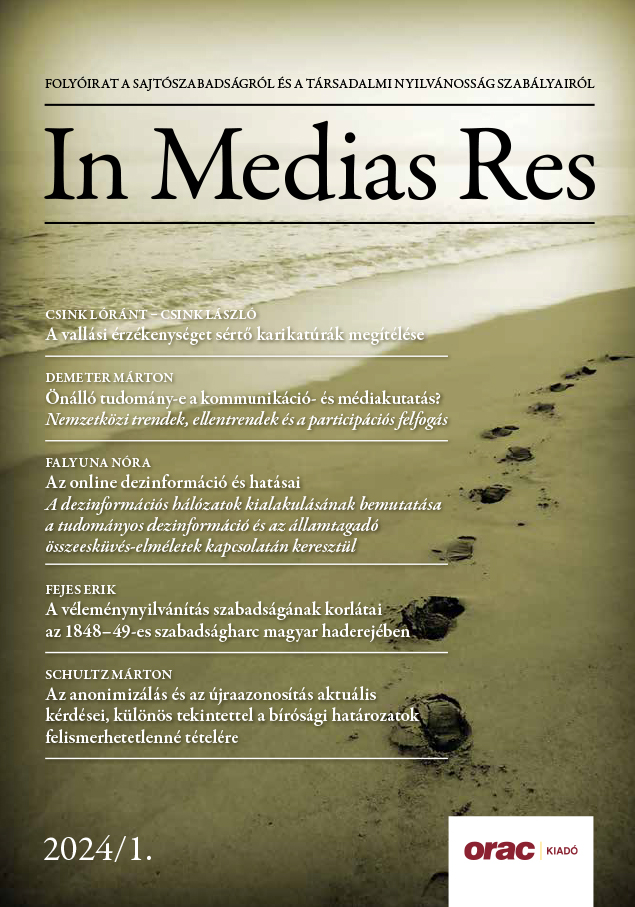Current Issues of Anonymisation and Re-Identification, With Special Regard to the Rendering of Court Decisions Unrecognisable
DOI:
https://doi.org/10.59851/imr.13.1.5Keywords:
data protection, anonymisation, rendering unrecognisable, pseudonymisation, court decisionsAbstract
Anonymisation is not just about rendering or blacking out names and identifiers. It is demonstrated by the fact that all of us have come across situations where, despite all these apparent efforts at anonymisation, a person has remained recognisable, or has become so after a few simple Internet searches. This paper outlines the current issues of anonymisation, paying particular attention to the trends in EU and Hungarian legal interpretation of the relative approach to the concept of personal data, as well as to the distinction between anonymisation and pseudonymisation. A number of good practices on anonymisation and non-disclosure will be presented in order to optimise the practices of both public authorities and private actors. In particular, the focus will be on the specific rules for the publication of judicial decisions, which are accessible to all without any limitation in time. The study also focuses on the issue of court and public authority case numbers, and the de-identification of public figures, however, its greatest contribution is the collection and presentation of good and bad practices in specific cases.
References
Balogh Zsolt György: A bírósági határozatok közzétételének szabályozása Magyarországon. Infokommunikáció és Jog, 2013/2., 84–89.
Bobek, Michal: Data Protection, Anonymity and Courts. 26(2) Maastricht Journal of European and Comparative Law (2019) 183–189., https://doi.org/10.1177/1023263X19851628 DOI: https://doi.org/10.1177/1023263X19851628
Czapári Dóra – Szőke Gergely László: Az adatvédelem és az adathasznosítás egyik kulcskérdése: a személyes adatok anonimizálása. JURA, 2022/4., 24–48.
Csányi, Gergely Márk et al.: Challenges and Open Problems of Legal Document Anonymization. 13(8) Symmetry (2021), https://doi.org/10.3390/sym13081490 DOI: https://doi.org/10.3390/sym13081490
Determann, Lothar: Determann adatvédelmi jogi útmutatója. Budapest, HVG-ORAC, 2020.
Görög Márta: A bírósági ítéletek anonimizálásának gyakorlata a német és osztrák bírói fórumokon. Infokommunikáció és Jog, 2013/2., 81–84.
Gruodytė, Edita – Milčiuvienė, Saulé: Anonymization of Court Decisions: Are Restrictions on the Right to Information in „Accordance with the Law”? 9(2) Baltic Journal of Law & Politics (2016) 150–170., https://doi.org/10.1515/bjlp-2016-0016 DOI: https://doi.org/10.1515/bjlp-2016-0016
Gruodytė, Edita – Milčiuvienė, Saulé: Anonymization of Court Decisions in the EU: Actual and Comparative Issues. Teisės Apžvalga Law Review, 2018/2., 60–70., https://doi.org/10.7220/2029-4239.18.3 DOI: https://doi.org/10.7220/2029-4239.18.3
Halász Bálint: A Kúria megerősítette a személyes adatok fogalmának relatív megközelítését. TwoBirdsIdeas, 2019. november 27., https://bit.ly/4adau68.
Pók László: Hozzáférési jog gyakorlása álnevesített adatok tekintetében. GDPR – adatvédelem mindenkinek, 2023. október 18., https://bit.ly/44vtUSL.
Révész Balázs: 4. Alapfogalmak. In Péterfalvi Attila – Révész Balázs – Buzás Péter (szerk.): Magyarázat a GDPR-ról. Budapest, Wolters Kluwer, 2018, 63–94.
Schultz Márton: A 2021. évben hozott szellemitulajdon-jogi tárgyú bírósági határozatok számossága, elvi tartalma és rövid tartalma. Iparjogvédelmi és Szerzői Jogi Szemle, 2022/6., 76–108.
Tamper, Minna et al.: Anonymization Service for Finnish Case Law: Opening Data Without Sacrificing Data Protection and Privacy of Citizens. Paper presented at International Conference on Law via the Internet, Florence, Italy, 2018.
Ződi Zsolt: A bírósági határozatok és iratok nyilvánossága a common law egyes országaiban és az EU bíróságain. Infokommunikáció és Jog, 2013/2., 76–80.
Ződi Zsolt: A bíróságok és a technológia. Bírósági Szemle, 2020/1., 4–13.
Downloads
Published
How to Cite
Issue
Section
License
Copyright (c) 2024 Schultz Márton

This work is licensed under a Creative Commons Attribution 4.0 International License.


